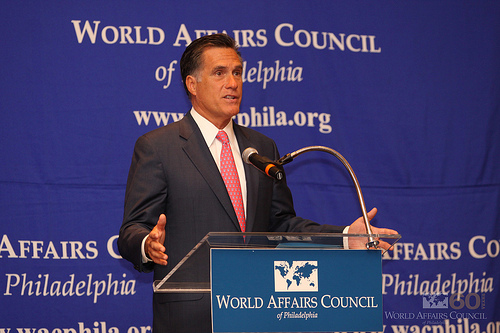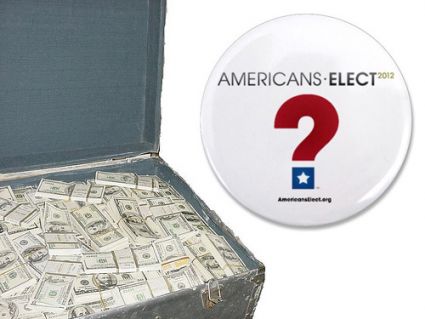Sometimes I wonder if amidst all of our world-weary cynicism we are even cynical enough. It’s hard to wrap your mind around the immensity of the problem of money in politics, but it’s this part of it that still shocks and depresses me. Thomas Edsall wrote this column earlier this week:
Four years after the 2008 collapse, the finance industry has regained its dominant position in American politics. Perhaps the development of deepest significance is an absence: the failure of a powerful anti-Wall Street faction to emerge in either the House or the Senate. This is in contrast to the response to previous financial crises, when Congress enacted tough legislation—after the Savings and Loan implosion of the 1980s, for example, and more recently after the bankruptcy of Enron and WorldCom in the early 2000s.
Look at the current political environment this way: if Mitt Romney’s campaign and the Romney-supporting super PAC Restore Our Future were a public company, the financial services industry would have a controlling interest. President Obama, in turn, has been noticeably cautious in his critique of Wall Street, trying instead to focus on Romney’s former company, Bain Capital. Obama’s ambivalence about speaking out is a tacit victory for the industry.
Indeed it is. And you can see the results of such far-reaching influence when you read this amazing piece by Matt Taibbi:
The American people will never again be asked to foot the bill for Wall Street’s mistakes,” Obama promised. “There will be no more taxpayer-funded bailouts. Period.”
Two years later, Dodd-Frank is groaning on its deathbed. The giant reform bill turned out to be like the fish reeled in by Hemingway’s Old Man—no sooner caught than set upon by sharks that strip it to nothing long before it ever reaches the shore. In a furious below-the-radar effort at gutting the law—roundly despised by Washington’s Wall Street paymasters—a troop of water-carrying Eric Cantor Republicans are speeding nine separate bills through the House, all designed to roll back the few genuinely toothy portions left in Dodd-Frank. With the Quislingian covert assistance of Democrats, both in Congress and in the White House, those bills could pass through the House and the Senate with little or no debate, with simple floor votes—by a process usually reserved for things like the renaming of post offices or a nonbinding resolution celebrating Amelia Earhart’s birthday.
So maybe they stop this. It’s an election year and a little sunlight might make them think twice. But it won’t be the end. As we’ve seen with JP Morgan’s recent little 2 billion (and counting) boo boo, the regulators aren’t regulating and even if they did, it’s entirely probable that the Volcker Rule wouldn’t have applied. I don’t know what to do about this and I haven’t heard anyone come up with anything systemic that this Congress will pass or that this Supreme Court will allow to stand. It’s a paralyzing problem, which is why we avoid thinking about it too much, I suppose. (Taibbi has a fun idea that certainly can’t hurt.)
It’s also why I feel nearly frantic at the idea of the Democrats eagerly buying into the idea of Grand Bargain redux as we face the so-called “fiscal cliff” after the election. I see very little reason to believe any of the Bush tax cuts will be allowed to expire. That ship sailed when the Democrats didn’t bother extending only the middle class cuts early in Obama’s term. If a deal is struck—a big if—the most probable outcome I see is for the Tweedle-dee and Tweedle-dumb of deficit reduction, Simpson and Bowles, to make a comeback (they’re already in tryouts) and for the “deal” to be tragic cuts to the safety net in exchange for “tax reform.”
“Tax reform” is commonly understood by just about everyone to mean “lower the rates, broaden the base, close loopholes, end tax expenditures.” Now go read that Taibbi article about the fate of Dodd-Frank if you haven’t already and tell me just how likely you think it is that such “reform” will end up being a worthwhile exchange for cutting vital programs and America’s safety net. Right. Those “reforms”, to the extent they attempt to raise any taxes on corporations and millionaires, will be quickly dispatched to the dustbin. Indeed, it’s likely that the only people to see their taxes raised are those at the lower end of that broad base.
So, even though it’s vitally needed, any kind of financial or tax “reform” in the near future is going to be subject to this tidal wave of money that’s overtaken our political system. When you have the level of income inequality and corporate profits we have today, buying the political system is a very cheap investment. Until that problem is solved, I’m afraid that any “balanced approach” that puts the well being of average Americans on the table in exchange for shared sacrifice from the one percent is a fools errand.












